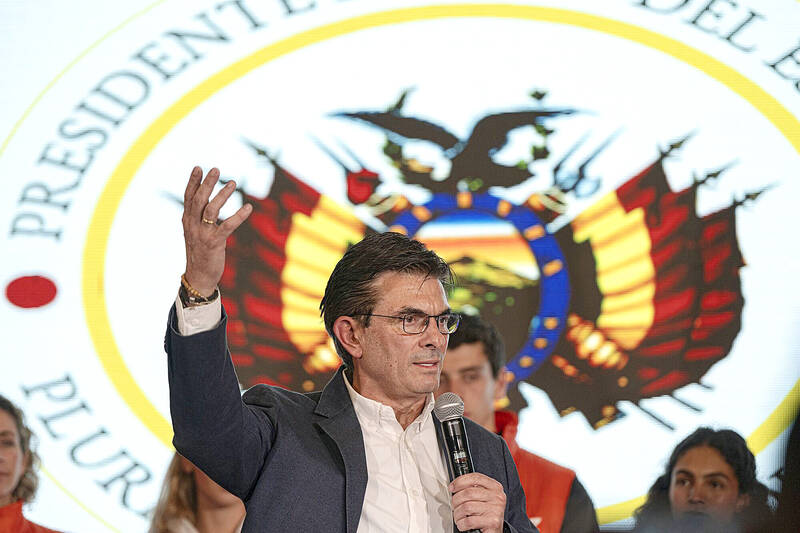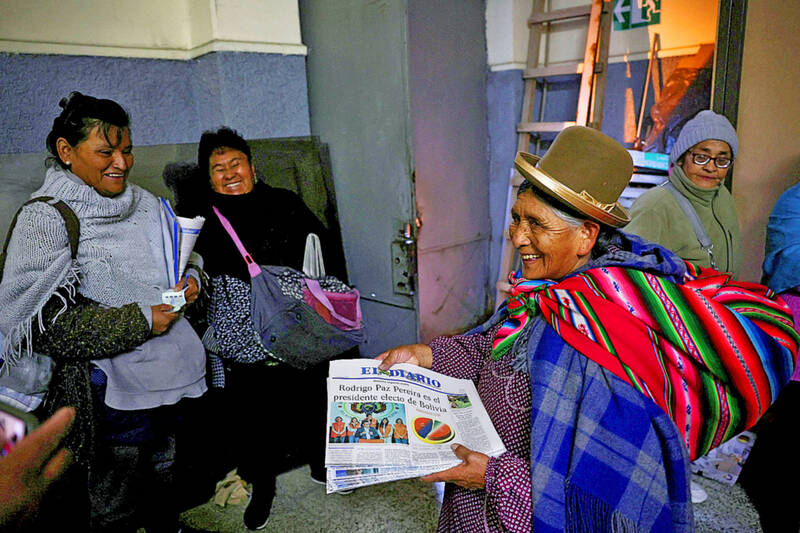Bolivians on Sunday elected a pro-business center-right senator as their new president, ending two decades of socialist rule that left the South American nation deep in economic crisis.
With 97.8 percent of ballots counted, Rodrigo Paz had 54.6 percent of the vote to 45.4 percent for his rival, right-wing former interim president Jorge “Tuto” Quiroga, the Supreme Electoral Tribunal said.
The news was greeted with joy, music and fireworks on the streets of La Paz.

Photo: Bloomberg
“We came to celebrate the victory with great hope of a new direction for Bolivia,” said Julio Andrey, a 40-year-old lawyer.
Paz, the 58-year-old son of a former president, has vowed a “capitalism for all” approach to economic reform, with decentralization, lower taxes and fiscal discipline mixed with continued social spending.
In his victory address, Paz said Bolivia was “reclaiming its place on the international stage.”

Photo: Reuters
Paz also said he had received a congratulatory message from US President Donald Trump, while US Secretary of State Marco Rubio said Washington “stands ready to partner with Bolivia on shared priorities.”
“After two decades of mismanagement, president-elect Paz’s election marks a transformative opportunity for both nations,” Rubio said.
Under former Bolivian president Evo Morales, the nation took a sharp turn to the left: nationalizing energy resources, breaking ties with Washington, and making alliances with China, Russia and fellow leftists in Cuba, Venezuela and elsewhere in Latin America.
After the results were announced, Paz’s vice presidential running mate, Edmand Lara, made a call for “unity and reconciliation” after a bitter campaign.
While Bolivia is enduring its worst economic crisis in decades, he promised improvements are on the horizon.
“We must ensure the supply of diesel and gasoline. People are suffering. We need to stabilize the prices of the basic food basket, and we must put an end to corruption,” he said.
Long lines for fuel have become a way of life in Bolivia, with US dollars in short supply and annual inflation of more than 20 percent.
In a first electoral round in August, crisis-weary voters snubbed the Movement Toward Socialism (MAS) party founded by Morales.
Sunday’s election closes out an economic experiment marked by initial prosperity funded by Morales’ nationalization of natural gas reserves.
The boom was followed by bust, notably with critical shortages of fuel and foreign currency under outgoing Bolivian President Luis Arce.
“We hope the country improves,” said homemaker Maria Eugenia Penaranda, 56, bundled up against the cold as she cast her vote in La Paz, about 3,600m above sea level.
“We cannot make ends meet. There is a lot of suffering. Too much,” she said.
Successive governments underinvested in the country’s hydrocarbons sector, once the backbone of the economy.
Production plummeted and Bolivia almost depleted its US dollar reserves to sustain a universal subsidy for fuel that it can also no longer afford to import.
Analyst Daniela Osorio of the German Institute for Global and Area Studies told AFP that Bolivians’ patience was running out.
Once the election is over, she warned that “if the winner does not take measures to help the most vulnerable, this could lead to a social uprising.”
Morales said after the results were announced, the president-elect has urgent and “serious issues” to resolve, such as the fuel and dollar shortages.
Paz faces an uphill task, inheriting an economy in recession, according to the World Bank.
He had promised to maintain social programs while stabilizing the economy, but economists have said the two things are not possible at the same time.
“He has maintained a very calm, centrist tone... he has connected with people who want change, but not radical change,” political scientist Gabriela Keseberg said of Paz’s victory.
Paz on Sunday said that his governance style would be one of “consensus.”
He would not have a party majority in Congress, meaning he would need to make concessions to get laws passed.
Outside of Congress, the new president would also face stiff opposition from Morales, who remains popular — especially among indigenous Bolivians — but was constitutionally barred from seeking another term.
Quiroga on Sunday said his team would review the official results, but congratulated Paz on his victory nevertheless.

NATIONAL SECURITY THREAT: An official said that Guan Guan’s comments had gone beyond the threshold of free speech, as she advocated for the destruction of the ROC China-born media influencer Guan Guan’s (關關) residency permit has been revoked for repeatedly posting pro-China content that threatens national security, the National Immigration Agency said yesterday. Guan Guan has said many controversial things in her videos posted to Douyin (抖音), including “the red flag will soon be painted all over Taiwan” and “Taiwan is an inseparable part of China,” while expressing hope for expedited “reunification.” The agency received multiple reports alleging that Guan Guan had advocated for armed reunification last year. After investigating, the agency last month issued a notice requiring her to appear and account for her actions. Guan Guan appeared as required,

Japan and the Philippines yesterday signed a defense pact that would allow the tax-free provision of ammunition, fuel, food and other necessities when their forces stage joint training to boost deterrence against China’s growing aggression in the region and to bolster their preparation for natural disasters. Japan has faced increasing political, trade and security tensions with China, which was angered by Japanese Prime Minister Sanae Takaichi’s remark that a Chinese attack on Taiwan would be a survival-threatening situation for Japan, triggering a military response. Japan and the Philippines have also had separate territorial conflicts with Beijing in the East and South China

A strong cold air mass is expected to arrive tonight, bringing a change in weather and a drop in temperature, the Central Weather Administration (CWA) said. The coldest time would be early on Thursday morning, with temperatures in some areas dipping as low as 8°C, it said. Daytime highs yesterday were 22°C to 24°C in northern and eastern Taiwan, and about 25°C to 28°C in the central and southern regions, it said. However, nighttime lows would dip to about 15°C to 16°C in central and northern Taiwan as well as the northeast, and 17°C to 19°C elsewhere, it said. Tropical Storm Nokaen, currently

PAPERS, PLEASE: The gang exploited the high value of the passports, selling them at inflated prices to Chinese buyers, who would treat them as ‘invisibility cloaks’ The Yilan District Court has handed four members of a syndicate prison terms ranging from one year and two months to two years and two months for their involvement in a scheme to purchase Taiwanese passports and resell them abroad at a massive markup. A Chinese human smuggling syndicate purchased Taiwanese passports through local criminal networks, exploiting the passports’ visa-free travel privileges to turn a profit of more than 20 times the original price, the court said. Such criminal organizations enable people to impersonate Taiwanese when entering and exiting Taiwan and other countries, undermining social order and the credibility of the nation’s